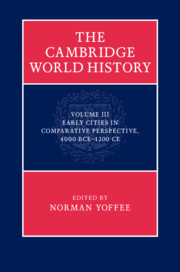Book contents
- The Cambridge World History
- Series page
- The Cambridge World History
- Copyright page
- Contents
- Figures
- Maps
- Tables
- Contributors
- Preface
- 1 Introduction: a history of the study of early cities
- Part I Early cities as arenas of performance
- Part II Early cities and information technologies
- Part III Early urban landscapes
- Part IV Early cities and the distribution of power
- Part V Early cities as creations
- Part VI Early imperial cities
- 23 Neo-Assyrian capital cities: from imperial headquarters to cosmopolitan cities
- 24 Mexico-Tenochtitlan: origin and transformations of the last Mesoamerican imperial city
- 25 The archetypal imperial city: the rise of Rome and the burdens of empire
- 26 Imperial cities
- 27 Conclusion: the meanings of early cities
- Index
27 - Conclusion: the meanings of early cities
from Part VI - Early imperial cities
Published online by Cambridge University Press: 05 March 2015
- The Cambridge World History
- Series page
- The Cambridge World History
- Copyright page
- Contents
- Figures
- Maps
- Tables
- Contributors
- Preface
- 1 Introduction: a history of the study of early cities
- Part I Early cities as arenas of performance
- Part II Early cities and information technologies
- Part III Early urban landscapes
- Part IV Early cities and the distribution of power
- Part V Early cities as creations
- Part VI Early imperial cities
- 23 Neo-Assyrian capital cities: from imperial headquarters to cosmopolitan cities
- 24 Mexico-Tenochtitlan: origin and transformations of the last Mesoamerican imperial city
- 25 The archetypal imperial city: the rise of Rome and the burdens of empire
- 26 Imperial cities
- 27 Conclusion: the meanings of early cities
- Index
Summary
Keywords
- Type
- Chapter
- Information
- The Cambridge World History , pp. 546 - 557Publisher: Cambridge University PressPrint publication year: 2015
- 5
- Cited by

